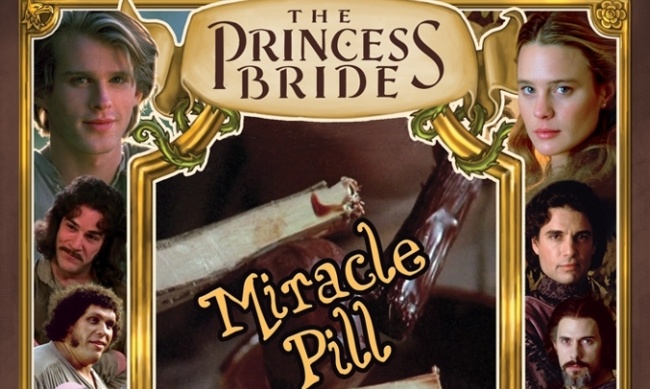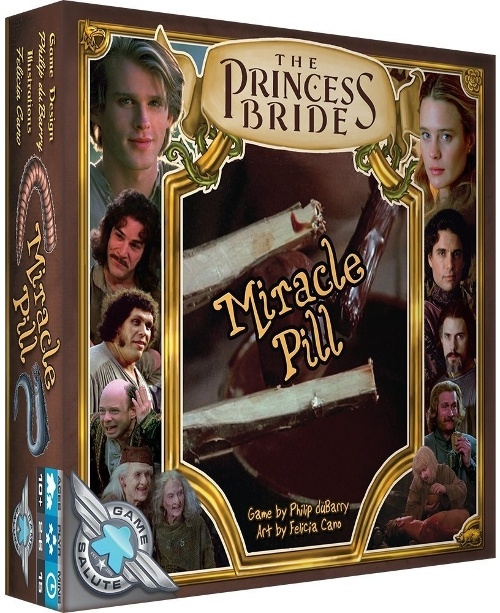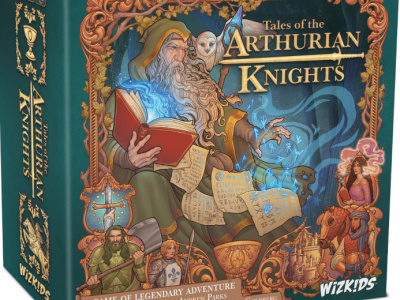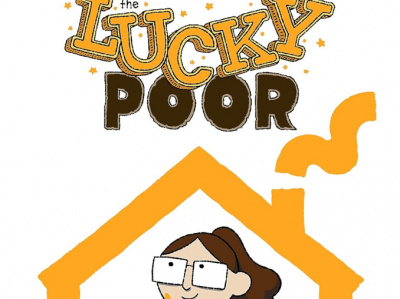The Princess Bride: Miracle Pill
Publisher: Game Salute
Release Date: 2015
Price: $25.00
Game Designer(s): Philip duBarry; illustrations by Felicia Cano
Format: Card game
Number of players: 2-6
Playing Time: 15+ minutes
Age Rating: 10+
ISBN: N/A
ICv2 Rating: 4 stars out of five
The production values for this little card game are delightful, ranging from the photos of the cast of the film on the box cover to the beautifully illustrated cards. The mechanics of the game fall halfway between Sushi Go and Seven Wonders. Like those, it's a game in which you play one card from your current hand and pass the rest to an adjacent player. The rules are simple and easy to learn.
The basic mechanics are that you play potion ingredients onto your "workbench" and then use them to create potions that score varying point values. Combinations of various kinds increase the values. Poisons can decrease the holdings of your opponents, individually or overall. Some cards are protective. Some are just flexible, allowing you to do cool things. You can basically forfeit a regular play in order to create a "wild card" ingredient for future potions. Judgment of what to play out of each hand really does take strategy, but mostly it's a quick play while hoping to complete a potion that benefits you.
The price is a bit high for a single deck of 72 cards and a simple rule sheet, but forgivable when you look at the quality of the cards. The only real flaw is in the game itself. Like many Kickstarter games, it has the feeling of being almost playtested. In this case, the result was a flaw which can easily be corrected in one of two ways.
During the game as designed, you get very few plays. This means that luck can play a large role in the final score, because a very few cards have an overwhelming effect in play. There are two cards in the deck which can triple the score of certain other cards, and these two can be overwhelming if paired with either of two other cards that have a high value. If a single player gets one or more of these triplers, along with an eligible card worth multiplying, they generally win.
The two suggestions that came up in play were to either reduce those to only doubling the values of another card, or to play a game of three rounds, instead of just one. Reducing the multipliers to only times two means that there are other ways of achieving a comparable score, so the luck of the draw is less dominant. Playing three rounds means that no single stroke of luck will win you the game outright. When our local group tested this idea, the scores averaged out quite a bit. Luck still can play a part, but is not as dominant. Even when one person got two multipliers in the same round, that person only won the whole game by a few points, and it remained competitive and interesting.
The Princess Bride fans will find a lot to enjoy in this quick game, but knowledge of the book and movie is not at all necessary. Even the extended version suggested here takes under an hour. Because different players find different strategies, which then must vary due to the draw of the cards, it is very replayable.
--Nick Smith: Librarian Technician, Community Services, for the Pasadena Public Library in California.

ICv2 Stars: 4 (out of 5)
Posted by Nick Smith on October 27, 2015 @ 2:19 am CT
MORE GAMES
For Fall
April 26, 2024
WizKids will release a new range of Critical Role Unpainted Miniatures for Fall.
With Excalibur and Holy Grail Promo Meeples
April 26, 2024
WizKids will release Tales of the Arthurian Knights, a standalone sequel to Z-Man’s Tales of the Arabian Nights, with Excalibur and Holy Grail Promo Meeples with every case.
MORE REVIEWS
ICv2 Stars: 3.5 (out of 5)
February 23, 2024
Here's a review of The Lucy Poor graphic novel, published by Iron Circus.
ICv2 Stars: 4 (out of 5)
February 20, 2024
Here's a review of Nina Simone in Comics, published by NBM Publishing.








